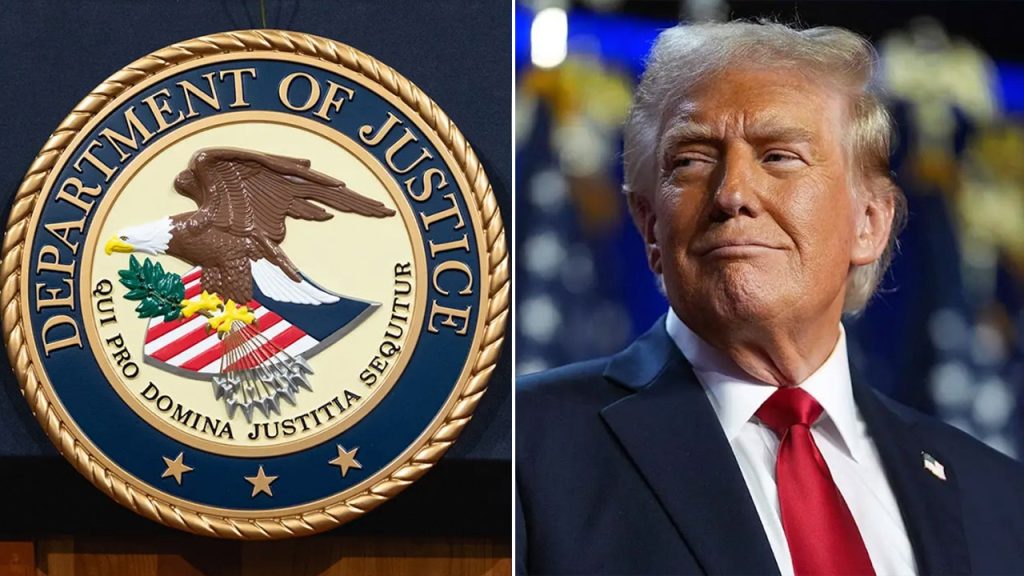In a significant move, former President Donald Trump has directed the Justice Department to dismiss all remaining U.S. attorneys appointed by the Biden administration. In a recent post on his Truth Social platform, Trump criticized the agency as being “politicized like never before” and called for an immediate overhaul. This directive aligns with standard operating procedures for transitioning administrations but raises questions about the impact on ongoing investigations and the impartiality of the justice system.
| Article Subheadings |
|---|
| 1) Trump’s Justification for Dismissals |
| 2) Historical Context of U.S. Attorney Changes |
| 3) Previous Administration Dynamics |
| 4) Recent Resignations Sparked by Trump’s Actions |
| 5) Implications for the Justice System |
Trump’s Justification for Dismissals
In a detailed announcement through his social media, Trump expressed concerns about the perceived politicization of the Justice Department. He stated, “We must ‘clean house’ IMMEDIATELY, and restore confidence,” emphasizing that a fair justice system is essential for the United States. Trump’s assertion that the Justice Department has been compromised aligns with his narrative throughout the 2024 presidential campaign, wherein he characterized legal actions against him as a deliberate attack orchestrated by the Biden administration. The former president framed this move as a necessary step toward establishing a trustworthy Justice Department, an appeal that resonates with his base, particularly those who feel disenfranchised by current governance.
Historical Context of U.S. Attorney Changes
Since the inception of American politics, transitions between administrations have led to a reshuffling of U.S. attorneys, who serve as the top federal law enforcement officials within their districts. This procedural norm, however, often sparks controversy, particularly when it involves the termination of attorneys who may be involved in high-profile investigations. Under normal circumstances, newly elected presidents typically request the resignations of their predecessors’ appointees rather than issuing outright terminations. This approach both respects previous appointments and ensures continuity in ongoing cases, a factor that is now under scrutiny following Trump’s directive.
Previous Administration Dynamics
The investigatory practices of U.S. attorneys were notably highlighted during the Trump administration itself, particularly in the high-stakes probes led by Special Counsel Jack Smith. After taking office in 2017, Trump dismissed several dozen federal prosecutors, a decision that conveniently eliminated those appointed during the Obama era. These dismissals often raised alarms regarding potential politicization of the judiciary. In previous years, as political climate shifts, attorneys handling sensitive legally contentious cases found themselves under the shadow of their job security, suggesting that political affiliation might unduly influence federal prosecutions.
Recent Resignations Sparked by Trump’s Actions
The recent directive has already resulted in abrupt resignations among high-ranking officials within the Justice Department. Specifically, Danielle Sassoon, who served as acting U.S. Attorney for the Southern District of New York, along with five other staff members, resigned following Trump’s instructions to withdraw a case against New York City Mayor Eric Adams. Adams had been facing corruption allegations, making this withdrawal highly contentious. Sassoon publicly criticized the move as an unacceptable quid pro quo, signaling deep divisions within the department already. Such internal friction threatens to undermine the integrity of the Justice Department further and raises significant concerns regarding who will effectively oversee prosecutorial decisions in the coming days.
Implications for the Justice System
The implications of Trump’s directive are multifaceted and complex. Many legal experts and officials fear that shifts in the U.S. attorney lineup may influence ongoing investigations and trials, particularly those linked to political figures or controversial cases. The foundational principle of justice— that it should be blind and fair—could be severely tested as new appointees may feel pressured to align with political agendas. Moreover, the quest for public trust in the justice system could face significant hurdles, as critics from both sides of the political spectrum voice their concerns about legitimacy and accountability within the ranks of federal prosecutors.
| No. | Key Points |
|---|---|
| 1 | Former President Trump has directed the Justice Department to terminate all U.S. attorneys appointed by Biden, citing politicization. |
| 2 | The terminations align with standard practices but raise concerns about ongoing investigations. |
| 3 | Recent resignations, notably of U.S. Attorney Danielle Sassoon, illustrate internal conflicts over the directive. |
| 4 | Trump’s actions may affect public trust in the Justice Department and the overall integrity of federal prosecutions. |
| 5 | The motivations behind Trump’s actions appear rooted in framing ongoing legal issues as politically motivated assaults. |
Summary
In summary, Trump’s directive to terminate Biden-appointed U.S. attorneys is raising significant concerns regarding the independence and integrity of the federal justice system. As key figures resign and investigations hang in the balance, the implications stretch beyond political maneuvering to touch upon the foundational principles of justice in the United States. The unfolding events will be crucial to observe, as they may shape the future dynamics of federal prosecution and the ability of the Justice Department to operate free from political influence.
Frequently Asked Questions
Question: What are U.S. attorneys and what is their role?
U.S. attorneys serve as the principal federal prosecutors in each of the 94 districts across the country, handling criminal cases, representing the United States in civil lawsuits, and maintaining the integrity of federal laws.
Question: Why do new administrations typically replace U.S. attorneys?
New administrations often request the resignation of U.S. attorneys to appoint individuals they believe align closely with their policies and visions for federal law enforcement, which can streamline the pursuit of their political agenda.
Question: How does the politicization of the Justice Department affect its operations?
When the Justice Department becomes politicized, it can undermine public confidence and the perception of impartiality in legal proceedings, potentially leading to selective enforcement of the law based on political considerations rather than justice.


